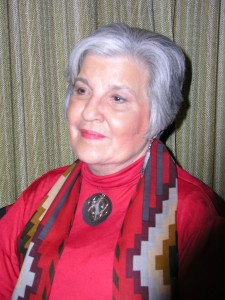Jillian Randel | February 4, 2011 | 1 Comment
By Jared Schultz

As a Cherokee poet, writer and speaker, Marilou Awiakta is a leading literary figure in the Appalachian region.
“I am a Cherokee-Appalachian woman who grew up with the atom,” writer Marilou Awiakta stated as we discussed her work and mission as a poet, storyteller and essayist.
The seventh generation of her family, Awiakta grew up in Oak Ridge, Tenn., a federal center for nuclear research. Over the course of her career as a writer, she has blended these seemingly disparate influences in her writing on environmental and social issues in such books as Abiding Appalachia: Where Mountain and Atom Meet and Selu: Seeking the Corn-Mother’s Wisdom.
“From nature and my relatives, I learned that everything in the universe is connected like a web. Each strand affects the other. My work is to make those connections visible,” she explained.
Our conversation flowed among discussions of modern gender roles, strip mining, mountain living and scientific evidence of nature’s laws and vibrations. Awiakta never once faltered in bringing these subjects together as one fluid thought. Her book Selu, first published in 1993, is structured the same way. She transitions between poems, traditional stories and journalistic pieces with the intent of creating the literary equivalent of a woven basket. Awiakta blends together ideas just as she blends literary techniques, seamlessly and with purpose.
“When I told my mother I wanted to be a poet, she said ‘that’s good, but what will you do for the people?’ All of my work has been in that mountain tradition—to take the material at hand and make something useful and comely for the community,” Awiakta said. “I wanted to create art for life’s sake as opposed to art for art’s sake.”
Dr. Theresa L. Burriss, Director of the Appalachian Regional Studies Center at Radford University, said of Awiakta’s legacy, “Awiakta provides such an important voice and perspective to Appalachian literature, as well as to the region’s social and environmental dialogue. Every time I talk with her, Awiakta speaks from a deep, heartfelt space inside her that beckons her ancestors and seeks to honor their memory, their legacy and their traditions.”
The feminism Awiakta supports is one that exists in balance with family and gender, so that female voices are equally influential in policy development. She refers to Cherokee beliefs about the collective potential of family and gender that existed before the arrival of Europeans, who tried to destroy that system.
“Woman had a respected place in governing society. It was an egalitarian idea that a balance of genders is best in any aspect of society,” said Awiakta. Today many nations have restored these traditional systems.
At 75, Awiakta continues to be active as a writer and speaker. Recognizing her reputation as a progressive thinker and her body of literary work, the Federal Deposit Insurance Corporation (FDIC) in Washington D.C. invited her this past November to speak at the organization’s Diversity Education Series program. Awiakta’s topic was “Balancing the Virtual and Real Worlds.” Summarizing her lecture, Awiakta told me, “Scientific evidence indicates that the overuse of electronics is causing a difference in human brain frequencies, creating a digital brain that only works in a binary way, not a holistic way.”
Awiakta hopes to use her poetic sensibilities and cultural foundations not only to raise awareness of such modern problems, but ultimately to encourage new generations to balance the virtual and real worlds. “I look forward to seeing how new generations will redefine the environment, gender roles, family and so on. The young people I have met in my travels inspire me to believe that they will do this well.”
By Jared
Marie L. Junaluska’s recent reappointment to the North Carolina Arts Council cements her presence and reputation as a master conveyor of Cherokee history and culture.
Junaluska grew up in the Qualla Boundary, home to the Eastern Band of Cherokee Indians (EBCI), speaking Cherokee as her first language.
Over the years, she has retained her first language to become an interpreter of the Cherokee language for the Smithsonian, Disney Imagineering and Western Carolina University, as well as teacher of the Cherokee language to students in Cherokee schools.
She received the Friends of Sequoyah Award in 2004 for her work on the Sequoyah Syllabary— the first written language of the Cherokee, and received the Peacemaker of the Year Award in 2008.
By Jared Schultz
Joyce Dugan was elected Chief of the Eastern Band of Cherokee Indians (EBCI) in 1995, becoming the first woman to ever lead in that role.
During her tenure she advocated for employment rights for the Cherokee, sought to revitalize Cherokee culture through language-focused government programs, repatriation and education issues in museum exhibits.
She also brought the Cherokee voice to the chorus of environmentalists seeking solutions to water quality and air pollution problems, as well as advocating for responsible game laws. She continues to work for the women and people of Western North Carolina through teaching and advocacy work.
Like this content? Subscribe to The Voice email digests
Everything is very open with a clear description of the challenges.
It was really informative. Your website is extremely helpful.
Many thanks for sharing!